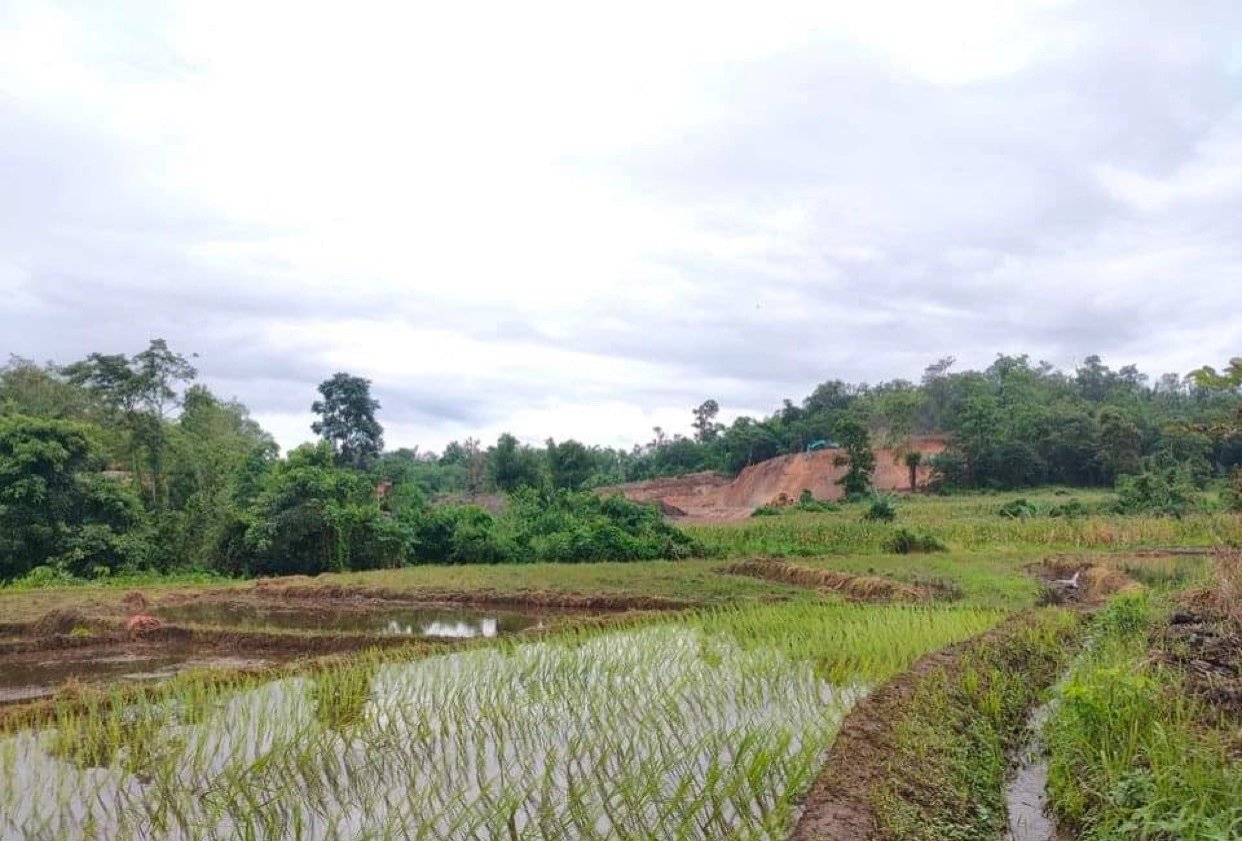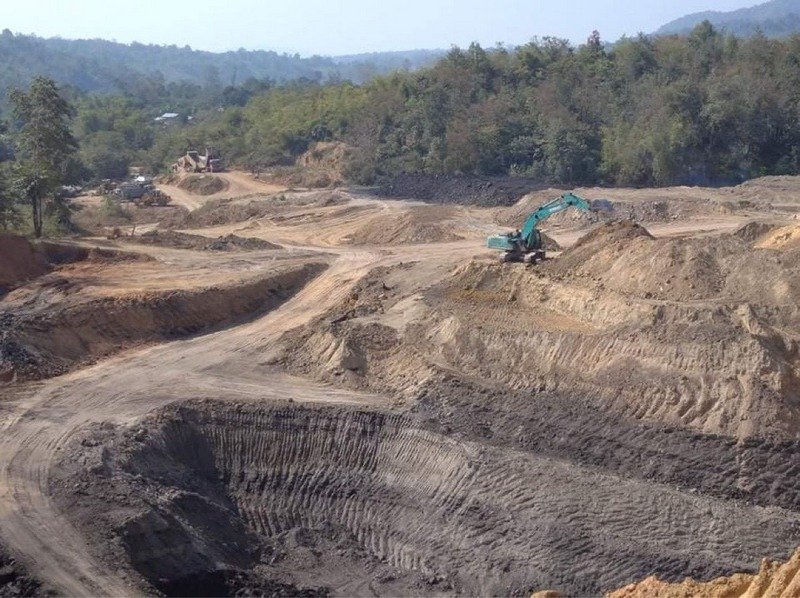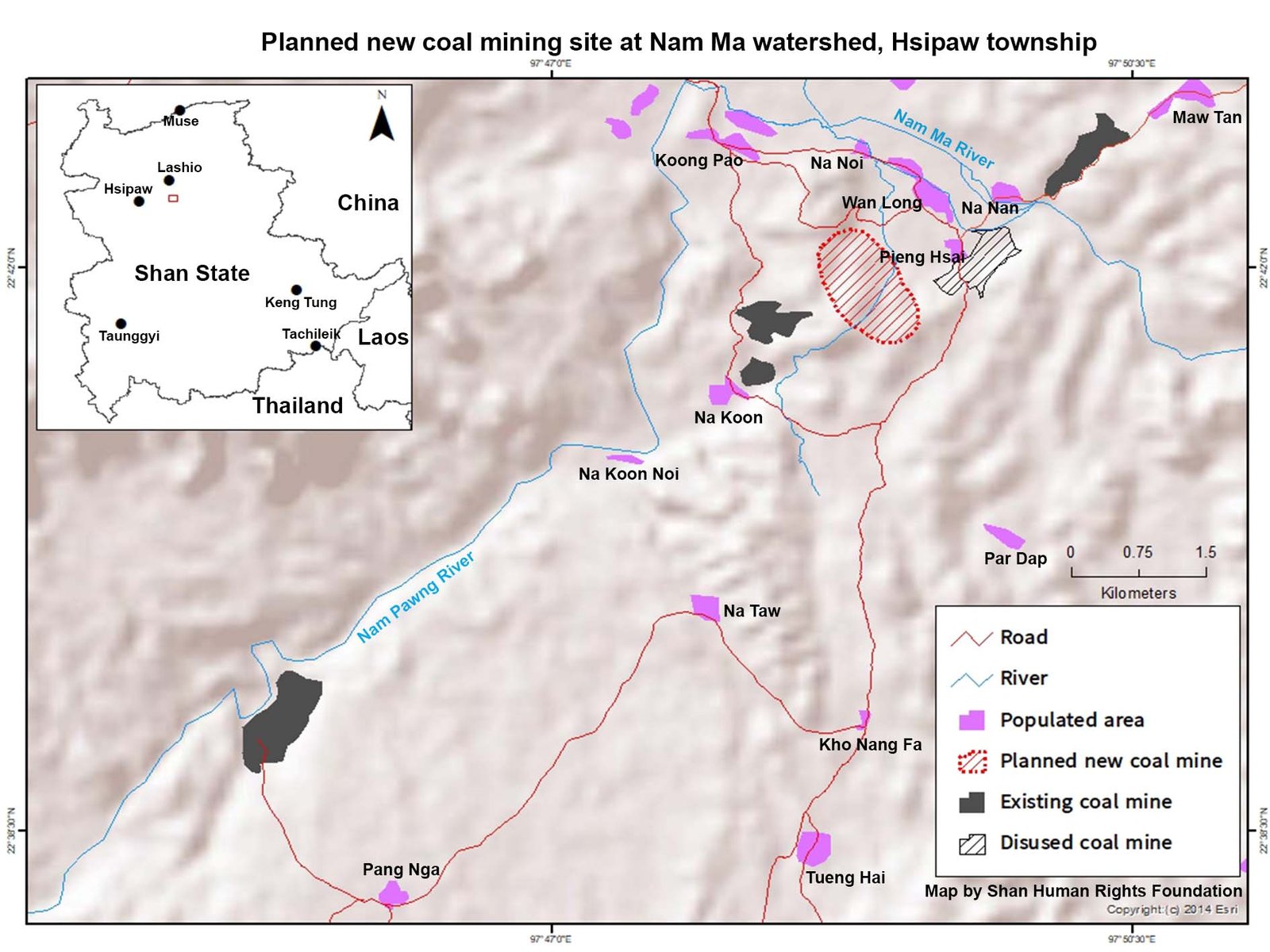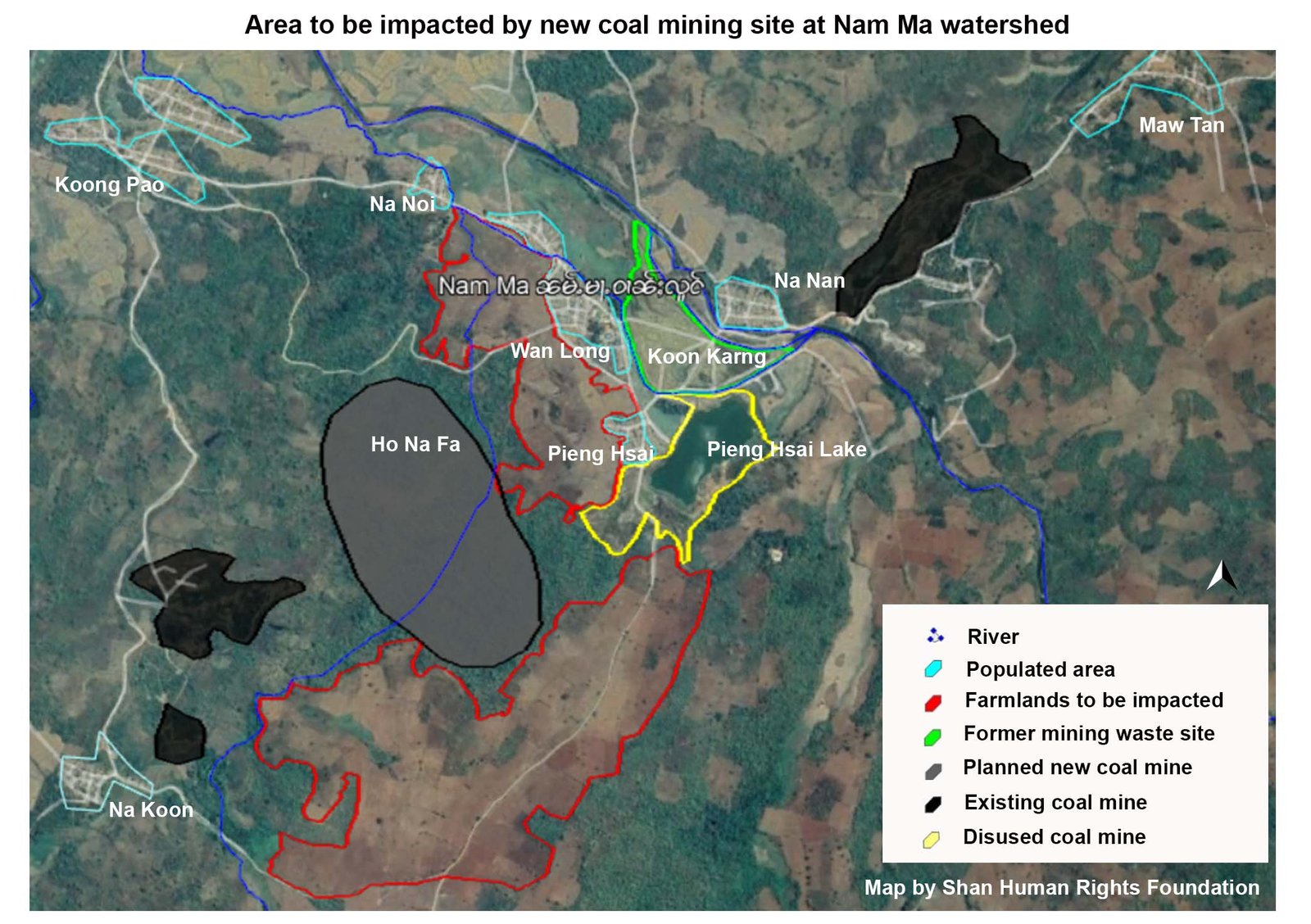Update by the Shan Human Rights Foundation
November 23, 2021
Ngwe Yi Pale to start new coal mine at Nam Ma watershed in Hsipaw, northern Shan State
The Mandalay-based Ngwe Yi Pale conglomerate is preparing to start a new coal mine at the Ho Na Fa watershed at Nam Ma in Hsipaw township, despite long-standing opposition from local villagers, who rely on this vital water source for their agricultural livelihoods.
Ngwe Yi Pale has been digging for coal in Nam Ma since 2004, and currently operates two mines there: one near Na Goon village and one near Koong Pao village. The mining has destroyed farmlands and irrigation sources, and caused water and air pollution, impacting over 3,000 people.
Locals have repeatedly urged Ngwe Yi Pale to stop mining, and on January 2, 2021, the company signed an agreement with village leaders to stop all coal mining operations at the Na Koon site by June 2021. The company also pledged not to encroach on or damage any watersheds in the area.
However, on February 25, only a few weeks after the military coup, the company met with local Shan authorities and informed them that the previous agreement was no longer valid, and they intended to carry on mining until there was no coal left in the area. The villagers were given no chance to dispute this.

Since then, Ngwe Yi Pale has continued mining at full capacity at both its mines in Nam Ma, and has expanded surface and underground mining at Na Koon, where new land cracks have appeared above the mining tunnels, fueling fears of further land collapse.
100 trucks a day have been transporting coal from Nam Ma to Ngwe Yi Pale’s two sugar factories (producing Sin Shweli sugar) and cement factory (producing Crown cement) in Nawng Khio township, as well as to factories in Mandalay and other parts of Burma. In July, coal transport was suspended for a few weeks due to Covid-19 lockdowns, but mining continued throughout.

Coal extraction has also continued at the other main mine at Nam Ma, north of Na Nan village, operated by Min Shwe Hlwa company, on behalf of the Burma Army’s Directorate of Defence Industries. Local villagers bathing in the Nam Ma river have noticed increased water contamination from this mine.
On October 14, the local Ngwe Yi Pale company manager came to meet the abbot of Nam Ma temple and informed him they wanted to start test digging at the Ho Na Fa watershed site. The abbot, who has sided with the company against the villagers, gave his agreement to the company to start digging. On October 20, the abbot informed local villagers at his temple that he had permitted the company to start test digging at Ho Na Fa, and said the new mining could not be stopped as the local Shan authorities had agreed to it.
The abbot also said that after all the coal at the Na Koon site was depleted, the company would start pumping water out of the disused coal pit next to Pieng Hsai village, and would start mining coal there again. Pieng Hsai was Ngwe Yi Pale’s first main mining site in Nam Ma, where they operated a large open pit mine from 2005 to 2015. Mining stopped when tunnels to expand the mine kept filling with water and collapsing. The disused pit was never filled in by the company, even though villagers had requested this, and has since become a lake.
On November 3, at a public gathering, the abbot again informed local villagers that Ngwe Yi Pale would start digging soon at the Ho Na Fa watershed.
The Ho Na Fa hill area is the main watershed for the entire Nam Ma tract and has been preserved for generations as a community forest, where no one is allowed to cut trees or farm. Streams flowing from Ho Na Fa irrigate hundreds of acres of rice fields, which provide the main livelihood for Nam Ma villagers.
Ngwe Yi Pale tried to start coal mining at Ho Na Fa in 2009, but was blocked by community leaders. Despite this, in April 2012, the company began secretly mining at the watershed, digging up 25 truckloads of coal, until they were stopped by the Shan State Progress Party/Shan State Army (SSPP/SSA), on the urging of local villagers.
Ngwe Yi Pale has clearly taken advantage of the military coup to push through long-held plans to extract and profit from the last ounce of coal in the Nam Ma area, regardless of damage to local villagers’ health and livelihoods, or to the area’s fragile ecology.
SHRF urges Ngwe Yi Pale to heed the wishes of local villagers, and to immediately stop all mining operations in Nam Ma and remove all equipment and personnel without delay.
Agreement signed by Ngwe Yi Pale with local village leaders before the coup:
(Translation from Shan)
January 2, 2021
The agreement of Ngwe Yi Pale company (Na Koon- Koong Pao mining site) to help local development in 2021.Starting from January to end of June.
- Money to help local development
- Reserve fund for Nam Ma 100,000,000 Kyat
- Reserve fund for village tract 10,000,000 Kyat
- *The agreement*
- From the day of signing the agreement, the company will continue mining smoothly.
- Mining will resume operation in the permitted area from January to the end of June 2021, where there is no impact on local farmers’ farmland and only in the previously permitted area.
- The company must restore/fill in any land cracks/damage completely within April 2021.
- The company must restore the “Koon Karng” (Note: This means “Middle Island” and refers to the large island in the Nam Ma river, where waste from the former Peing Hsai mine was dumped) completely within April, but if they fail to do so, they must provide compensation of 100,000,000 Kyat and the Nam Ma committee will then hire somebody to do this.
- The repair of the broken weir must be completed within April 2021. If not, the company must provide compensation of 100,000,000 Kyat for weir repair.
- There must be no expansion of coal mining into non-permitted areas, farmlands and watersheds. If these are affected or damaged, the company must provide compensation of one billion Kyat.
- If by the end of June, the company has not withdrawn and wants to continue mining, they must contribute another 500,000,000 Kyat to support local development.
- The sum of 110,000,000 Kyat to help local villagers must be handed over to local farmers in full by the end of February.
Signatures from Ngwe Yi Pale company
| No. | Name | Responsibility |
| 1. | U Yi Chan | On behalf of “boss” (lao pan) |
| 2. | Sai Maung | Manager |
| 3. | Loong Kyaw Khine (Mong Yai) |
PDF files
Contact
Sai Hor Hseng +66: 94-728-6696 (Shan, English)
Sai Yord Leun +66: 97-173-1530 (Shan, Burmese)





